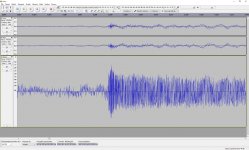The varistor after the 400 Vac.
And one of the two fuses also flew.
An externally hosted image should be here but it was not working when we last tested it.
And one of the two fuses also flew.
That's all wonderful Maty, but not really on topic of this thread. Why don't you start a thread in the computer audio section about your PC audio path tweaks. expect to be asked for some proof that these actually make a difference.
If you have valid concerns about PC audio used in tests like this, then you can point to your thread.
If you have valid concerns about PC audio used in tests like this, then you can point to your thread.
For me it is a hobby. I got fed up with the disqualifications I suffered in Spanish audio forums years ago. Audio is like football, everyone is an expert.
And the people are very ungrateful. They just want you to give it all well explained and with the least intellectual effort on your part.
Many years ago I managed a computer security community in Spanish (NAUTOPIA) and I got fed up. Forums and web (with manually edited HTML code by me).
Then the Hispanic list of AdBlock, of which I was the author. Only lawsuits and complaints so I stopped giving him public support. It was the best and completed list!
http://abp.mozilla-hispano.org/nauscopio/filtros.txt
No thank you. In the open Internet not <- too much aggression and lack of education.
And the people are very ungrateful. They just want you to give it all well explained and with the least intellectual effort on your part.
Many years ago I managed a computer security community in Spanish (NAUTOPIA) and I got fed up. Forums and web (with manually edited HTML code by me).
Then the Hispanic list of AdBlock, of which I was the author. Only lawsuits and complaints so I stopped giving him public support. It was the best and completed list!
http://abp.mozilla-hispano.org/nauscopio/filtros.txt
No thank you. In the open Internet not <- too much aggression and lack of education.
I tried this test again, now with Cambridge Audio DacMagic+, which is my best DAC at the moment. I was quite confident that I can hear a difference in ambience sounds in the beginning of the music sample, so I started the ABX. It was perfect until 8 trials,
but then I was lost and reached only 9/16, which makes a 40% probability of guessing. I will probably try again with shorter but multiple 8 trials tests and sum the result then. It is difficult to keep concentration for 16 trials with such a low sound difference.
I can hear more ambience in John, which I wrote in a PM to KSTR about a week ago, but I voted incorrectly for Paul as an original, as it sounded dryer to me and I thought it was a pseudo-ambience in John.
Code:
File A: John.flac
SHA1: 342e8e2481768f09a9ef4e61289f46c44c7ec7dd
File B: Paul.flac
SHA1: 187cfd12d0ca41c93281010f94cffc61986c4162
Output:
WASAPI (event) : Speakers (Cambridge Audio USB Audio 1.0), 24-bit
Crossfading: NO
08:17:46 : Test started.
08:18:36 : 01/01
08:18:44 : 02/02
08:18:51 : 03/03
08:18:59 : 04/04
08:19:08 : 05/05
08:19:18 : 06/06
08:19:25 : 07/07
08:19:37 : 08/08but then I was lost and reached only 9/16, which makes a 40% probability of guessing. I will probably try again with shorter but multiple 8 trials tests and sum the result then. It is difficult to keep concentration for 16 trials with such a low sound difference.
I can hear more ambience in John, which I wrote in a PM to KSTR about a week ago, but I voted incorrectly for Paul as an original, as it sounded dryer to me and I thought it was a pseudo-ambience in John.
Code:
foo_abx 2.0.2 report
foobar2000 v1.3.7
2018-12-06 08:17:46
File A: John.flac
SHA1: 342e8e2481768f09a9ef4e61289f46c44c7ec7dd
File B: Paul.flac
SHA1: 187cfd12d0ca41c93281010f94cffc61986c4162
Output:
WASAPI (event) : Speakers (Cambridge Audio USB Audio 1.0), 24-bit
Crossfading: NO
08:17:46 : Test started.
08:18:36 : 01/01
08:18:44 : 02/02
08:18:51 : 03/03
08:18:59 : 04/04
08:19:08 : 05/05
08:19:18 : 06/06
08:19:25 : 07/07
08:19:37 : 08/08
08:19:44 : 08/09
08:19:51 : 08/10
08:20:02 : 09/11
08:20:13 : 09/12
08:20:20 : 09/13
08:20:32 : 09/14
08:20:43 : 09/15
08:20:54 : 09/16
08:20:54 : Test finished.
----------
Total: 9/16
Probability that you were guessing: 40.2%
-- signature --
8ca1c5121fbfb7bc586bfe1e4262374861912a95
Last edited:
It was perfect until 8 trials, but then I was lost and reached only 9/16, which makes a 40% probability of guessing.
8/8 is obviously not guessing. But how about 0/8? This is where the 'statistic' goes wrong when it says the probability you are guessing is 100%!! 0/8 is actually a sign that you are not guessing.
Your first 8 trials gave 8/8. Your next 8 trials gave 2/8. You started to confuse which one is which after 8 trials.
The last optimizations that I have achieved have been to reduce the jitter generated by the CPU. There is a before and after after getting it.
I have been in it for months. If I optimize excessively the sound ends up being fatiguing.
Before I was excited with few recordings, more for the interpretation (like Nessun dorma by Franco Corelli, 1966) than for the sound quality but now I get it much more often and MORE, which is what really matters to me.
There is no jitter generated by the CPU. Playing audio takes almost zero resources and a few DMA operations on a modern PC. You are hearing things that do not exist.
I can play audio while I compile the Linux kernel using 16 threads in a VM while watching 4k 60 FPS video in another monitor and it sounds the same.
- Status
- This old topic is closed. If you want to reopen this topic, contact a moderator using the "Report Post" button.
- Home
- General Interest
- Everything Else
- Can you tell original file from three times DA-AD converted?
